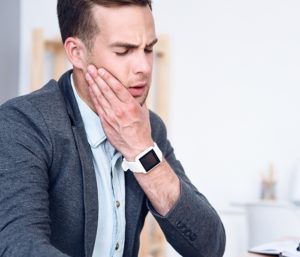ONE THING LEADS TO ANOTHER
January 24, 2022
 Studies have shown a link between teeth grinding, clenching and headaches. There are also links to people who have sleep breathing disorders, and those who take serotonin uptake inhibitors (SSRI). Some brand names of these drugs are Celexa, Lexapro, Prozac, Paxil and Zoloft. Many people grind and clench their teeth for many different reasons – let’s not forget STRESS!
Studies have shown a link between teeth grinding, clenching and headaches. There are also links to people who have sleep breathing disorders, and those who take serotonin uptake inhibitors (SSRI). Some brand names of these drugs are Celexa, Lexapro, Prozac, Paxil and Zoloft. Many people grind and clench their teeth for many different reasons – let’s not forget STRESS!
For people who grind or clench, the muscles that open and close the jaw can become painful from overuse, causing a range of symptoms from tension to migraine headaches to jaw joint (TMJ) problems to tooth pain. Here is a simple test – look at your tongue in the mirror without sticking it out. Are the borders smooth? If they are ridged, you are probably doing something outside of normal function.
Bruxing (grinding) and clenching teeth is defined as abnormal tooth contact (parafunction). Ordinarily, teeth should only be in contact while eating and swallowing, which is about 10 to 15 minutes on a daily basis. People who grind or clench their teeth during the day, or while sleeping, can have their teeth in contact for as much as six hours a day or more. Researchers say that one night of grinding is equivalent to 80 days of normal wear. Read that last sentence again.
Clenching can be just as bad, and in some cases, worse than grinding. The average person puts about 200 lbs. of force on back molars during function, but a person who clenches can put up to 1000 lbs. on the molars. This is a lot of force for the teeth to withstand. Fractured teeth are seen on a regular basis in dental offices due to clenching. Typically, a person will come in saying that their tooth broke while they were eating something soft. While that may be the case, often times clenching and/or grinding has weakened the tooth prior to it breaking.
The American Dental Association estimates that 95 % of the American population suffers from a grinding or clenching problem at some point in their lives. Some people do so much damage over time that they need a lot of dentistry to restore their teeth back to normal function. The key is early diagnosis and treatment.
Many patients do not realize, and some refuse to accept the fact that there is a problem. The reason for this is because many, if not most, do not have symptoms. The masticatory system is a very adaptive and forgiving system. Some even think their symptoms are just normal. However, if a problem is identified, accepted, and treated, it can help prevent numerous potential issues down the road.
Therefore, successful therapy starts with acceptance of the pathology present. In addition to behavior modification, nighttime bite splints can be very effective. They should be worn every night, not just when it “seems” like you have been grinding or clenching. It’s like wearing a knee brace. You wear the brace to support the knee to help prevent more injury.
Some patients require daytime splints because their issues are affecting them during the day, and a “night” guard might not be enough. Over-the-counter appliances are typically not recommended for a variety of reasons.
Ask your dentist whether you have any of the signs associated with grinding or clenching, and especially talk to your dentist if you have any symptoms. If the reason can be identified as to why this happening, it will direct the provider to offering the best solution for your specific situation.
One last thought: Read the first paragraph over. In most people, there is a reason for the grinding and/or clenching. There is a lot of interconnectedness between sleep and other issues. Sometimes, if you fix one thing, other things go away.
Dr. St. Clair maintains a private dental practice in Rowley and Newburyport dedicated to health-centered family dentistry. He has a special interest in treating snoring, sleep apnea and TMJ problems. If there are certain topics you would like to see written about or questions you have, please email them to him at jpstclair@stclairdmd.com
No Comments
No comments yet.
RSS feed for comments on this post.
Sorry, the comment form is closed at this time.







